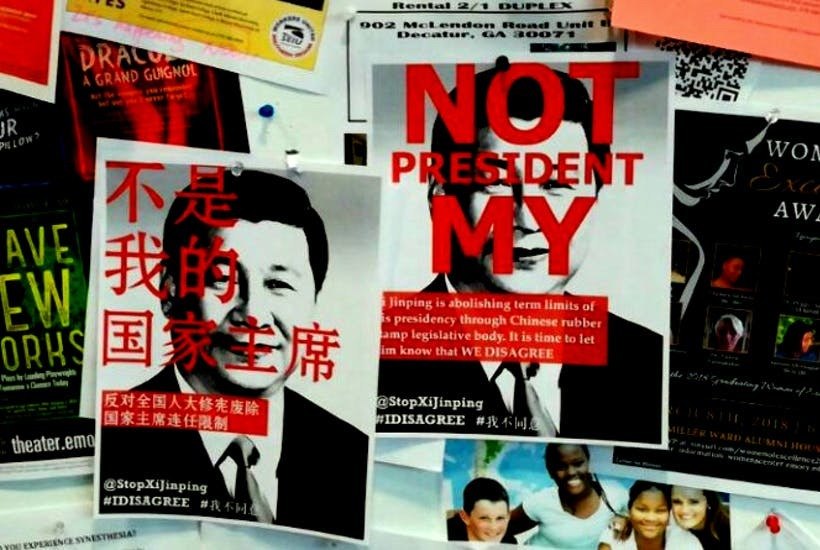At last, some students in the West are campaigning for freedom and democracy. Following years of supposedly rad students banning pop songs about sex, and force-fielding their campuses against offensive speakers, and even expelling certain newspapers from their common rooms as if they were heretical abominations, a group of students has emerged to demand more liberty, not less. They’re Chinese students, studying in Western universities, and the target of their youthful liberal ire is Chinese President Xi Jinping.
This week, Xi convinced the annual sitting of China’s parliament, the National People’s Congress, to scrap the two-term limit on presidency. They didn’t take much convincing, by the looks of things. Out of 2,964 votes, three delegates abstained and just two voted against Xi’s proposals. (I love those two rebels, whoever they are.) This was an exercise in rubber-stamping and it will mean Xi can go on for as long as he likes. A potential president for life. There are rumblings in China, very muted rumblings, of course, about Xi’s Maoist ambitions to dominate Chinese politics and how this will make an already undemocratic nation even less democratic.
But many young Chinese nationals in the West aren’t having it — and they’re speaking out. At universities in Britain, the US, Canada, Australia and New Zealand, Chinese students have been putting up posters that say ‘NOT MY PRESIDENT’. ‘Xi Jinping is abolishing term limits on the presidency… it is time to let him know that WE DISAGREE’, the posters declare. They’ve set up a Twitter account, @stopxijinping, and they have a hashtag: #IDISAGREE. ‘I disagree’ — a simple, clear, burning statement of dissent from Xi’s lordly ambitions. And one that people on the Chinese mainland would get into serious trouble for expressing.
A student at Australian National University, Wu Lebao, has plastered his campus with the posters. He says limitless presidents pose a ‘great danger to China’. The change suggests Xi wants to rule indefinitely, he says, ‘like Mao Zedong’. Wu knows the dangers of speaking freely in China itself. He fled China in 2013 and sought asylum in Australia after serving a jail sentence merely for expressing support for the Arab Spring. Now he exercises that most precious human gift that the Chinese state denies to its citizens — freedom of speech — to register his opposition to Xi.
There is a lesson in all this for Western-born students, especially for student leaders: freedom of speech is the most important liberty and it should never, ever be tampered with. It is a bracing fact, and a tragic fact, that many of today’s student-union stiffs and Safe Space enforcers behave more like the Chinese state than like these brilliant Chinese students agitating for greater democracy and the freedom to dissent. No, they don’t imprison people or execute people. But they do ban newspapers, as China’s rulers do. And they do censor controversial political speech, as China does. And they do maintain blacklists of, essentially, non-persons who are forbidden from speaking in public: the NUS has a list of all the groups and individuals who must be ‘No Platformed’ while China maintains a record of all thoughtcriminals and keeps a close eye on them for years.
And where China has erected a Great Firewall around its internet to keep out dangerous or disturbing ideas, Western student leaders enforce a Safe Space on their campuses in order to deflect ideas that don’t accord with their groupthink. The latest political grouping to be firewalled by Western students are so-called ‘trans-exclusionary radical feminists’, or TERFs, whose thoughtcrime is to call into question the idea that men can become women. This month, students at Bristol University decreed that TERFs are no longer welcome on campus. This is political censorship, pure and simple, and it is of a piece with China’s restrictions on speech that offends politicians or party officials.
China censors in order to maintain ‘public safety’; Western student leaders censor in order to maintain the Safe Space. China says certain ideas must be restricted because their expression could ‘spread violence’; Western student leaders claim ‘transphobia’ and ‘far-right’ speech will stir up hatred and maybe even violence on campus and therefore they must be restricted. The largely privileged Western-born students scrambling to purify their campuses of questionable ideas really could learn something from the Chinese-born students currently using their free speech to demand greater freedom. They might learn that right now they’re acting like youthful Maoists policing and punishing the speech of older generations or simply people who think differently, whereas it would be far preferable for them to align themselves with the anti-Xi crew who know the preciousness of freedom of speech and want to use it to strengthen the cause of democracy.


















